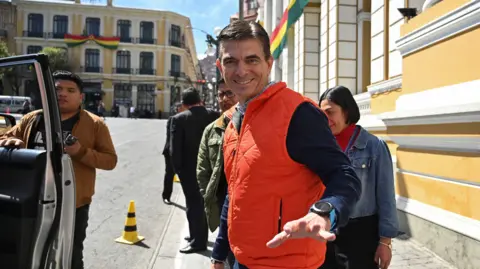In an unexpected political shift, Bolivia is poised to elect a non-left wing president for the first time in nearly twenty years, marking a significant transition after a long period dominated by the socialist party, Movimiento al Socialismo (MAS). This electoral development comes following the preliminary results of the recent elections, which took place on August 17, 2025. Senator Rodrigo Paz Pereira, representing the Christian Democratic Party (PDC), has emerged as a leading contender, alongside former president Jorge Quiroga.
The presidential contest highlights a profound change in Bolivia’s political landscape. Paz Pereira’s ascendance to the forefront of the electoral race was somewhat unanticipated, particularly as opinion polls had identified businessman Samuel Doria Medina as the leading candidate prior to the elections. Despite neither Paz Pereira nor Quiroga achieving a decisive majority, their positions have propelled them into a run-off scheduled for October, where the stakes will be exceedingly high.
Notably, Paz Pereira’s campaign has centered on economic reforms aimed at redirecting resources from the central government to regional entities. His slogan, “capitalism for all, not just a few,” resonates with many voters who are weary of the current economic hardships plaguing the country. To address these challenges, his proposals include accessible credit initiatives, tax incentives to stimulate the formal economy, and significant deregulation of imports for commodities that Bolivia does not produce.
Quiroga’s political lineage is intertwined with Bolivia’s history; he served briefly as interim president in the early 2000s after holding the vice-presidency under military dictator Hugo Banzer. Both candidates differ from the left-wing ideologies that have shaped Bolivia’s recent political narrative and, should one of them win, the implications for foreign policy and investment could be profound. The candidates are inclined towards supporting international investment, particularly concerning Bolivia’s vast lithium reserves—a critical element in the production of batteries for electric vehicles, laptops, and renewable energy solutions.
Paz Pereira’s unexpected lead reflects the dissatisfaction among voters regarding the incumbent administration’s handling of the economy, characterized by inflation, high public debt, and fuel shortages. The current president, Luis Arce, opted not to run for re-election amidst widespread unpopularity and the impending electoral backlash against MAS. Reports suggest that many citizens are eager for change, indicating a longing for reform or a reaction against the perceived failures of the left.
Tensions have surfaced at the polls as well, with violence and hostility directed towards left-wing candidates. Eduardo del Castillo, the MAS candidate, experienced a cold reception at the polling station, where he was verbally attacked by voters expressing their frustrations with the regime. Similarly, Andrónico Rodríguez, who previously aligned with MAS and later distanced himself from the party, faced aggression from constituents and a reported bombing incident at his voting location.
Historically, the November election surrounding Morales was mired in controversy as accusations of electoral fraud led to nationwide protests, culminating in Morales’s resignation. The ensuing political crisis exacerbated divisions within the MAS party, now struggling with numerous internal conflicts. Morales, although barred from running again due to legal challenges, still wields influence and has called on his supporters to boycott the election, further complicating the political landscape.
With Morales absent from the ballot for the first time since his rise to power in 2006, Bolivia finds itself at a crossroads. His departure has created a vacuum that candidates like Paz Pereira and Quiroga hope to fill, with each vying to shape the nation’s future. As Bolivia prepares for the run-off, the electorate remains sharply divided, and the upcoming months promise to be critical in determining the nation’s direction.
In summary, Bolivia’s upcoming presidential elections symbolize a possible pivot away from leftist governance that could reshape both domestic policy and international relations, especially with regards to trade and foreign investment. The implications of these elections will resonate well beyond the national borders, reflecting a broader trend of political realignment in the region.











